Related Research Articles

James Gillespie Blaine was an American statesman and Republican politician who represented Maine in the United States House of Representatives from 1863 to 1876, serving as Speaker of the U.S. House of Representatives from 1869 to 1875, and then in the United States Senate from 1876 to 1881.

The 1876 United States presidential election was the 23rd quadrennial presidential election, held on Tuesday, November 7, 1876. Incumbent Republican president Ulysses S. Grant declined to run for a third term, so the party chose Rutherford B. Hayes, the governor of Ohio, as its nominee. The Democratic Party nominated New York governor Samuel J. Tilden as their nominee. It was one of the most contentious presidential elections in American history. Its resolution involved negotiations between the Republicans and Democrats, resulting in the Compromise of 1877, and on March 2, 1877, the counting of electoral votes by the House and Senate occurred, confirming Hayes as president. It was the second of five U.S. presidential elections in which the winner did not win a plurality of the national popular vote. This is the first time it happened since 1824. Following President Grant's decision to retire after his second term, U.S. Representative James G. Blaine emerged as the frontrunner for the Republican nomination. However, Blaine was unable to win a majority at the 1876 Republican National Convention, which settled on Governor Hayes of Ohio as a compromise candidate. The 1876 Democratic National Convention nominated Governor Tilden of New York on the second ballot.
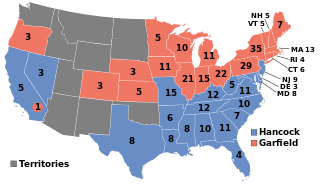
The 1880 United States presidential election was the 24th quadrennial presidential election, held on Tuesday, November 2, 1880, in which Republican nominee James A. Garfield defeated Winfield Scott Hancock of the Democratic Party. The voter turnout rate was one of the highest in the nation's history. Garfield was assassinated during his first year in office, and he was succeeded by his vice president, Chester A. Arthur.

The 1884 United States presidential election was the 25th quadrennial presidential election, held on Tuesday, November 4, 1884. In the election, Governor Grover Cleveland of New York defeated Republican James G. Blaine of Maine. It was set apart by unpleasant mudslinging and shameful personal allegations that eclipsed substantive issues, such as civil administration change. Cleveland was the first Democrat elected President of the United States since James Buchanan in 1856, the first to hold office since Andrew Johnson left the White House in 1869, and the last to hold office until Woodrow Wilson, who began his first term in 1913. For this reason, 1884 is a significant election in U.S. political history, marking an interruption in the era when Republicans largely controlled the presidency between Reconstruction and the Great Depression.
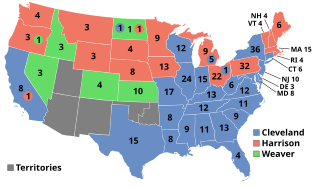
The 1892 United States presidential election was the 27th quadrennial presidential election, held on Tuesday, November 8, 1892. In the fourth rematch in American history, former Democratic President Grover Cleveland defeated incumbent Republican President Benjamin Harrison. Cleveland's victory made him the first and, to date, the only person in American history to be elected to a non-consecutive second presidential term. It was also the first of two times incumbents were defeated in consecutive elections—the second being Jimmy Carter's defeat of Gerald Ford in 1976, followed by Carter's subsequent loss to Ronald Reagan in 1980.
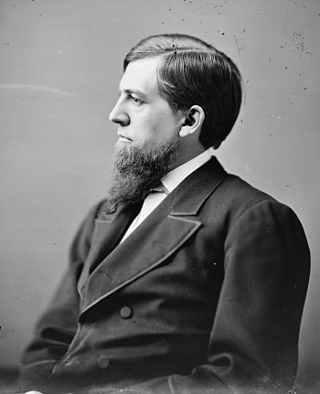
Eugene Hale was a Republican United States Senator from Maine.

The 1938 United States House of Representatives elections was an election for the United States House of Representatives were elections for the United States House of Representatives to elect members to serve in the 76th United States Congress. They were held for the most part on November 8, 1938, while Maine held theirs on September 12. They occurred in the middle of President Franklin D. Roosevelt's second term. Roosevelt's Democratic Party lost a net of 72 seats to the Republican Party, who also picked up seats from minor Progressive and Farmer–Labor Parties.
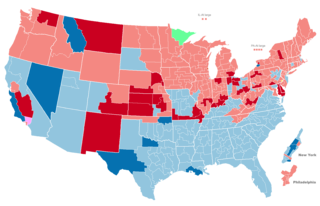
The 1918 United States House of Representatives elections were elections for the United States House of Representatives to elect members to serve in the 66th United States Congress. They were held for the most part on November 5, 1918, while Maine held theirs on September 9. They occurred in the middle of President Woodrow Wilson's second term.

1914 United States House of Representatives elections were elections for the United States House of Representatives to elect members to serve in the 64th United States Congress. They were held for the most part on November 3, 1914, while Maine held theirs on September 14. They were held in the middle of President Woodrow Wilson's first term.

The 1876 Republican National Convention was a presidential nominating convention held at the Exposition Hall in Cincinnati, Ohio on June 14–16, 1876. President Ulysses S. Grant had considered seeking a third term, but with various scandals, a poor economy and heavy Democratic gains in the House of Representatives that led many Republicans to repudiate him, he declined to run. The convention resulted in the nomination of Governor Rutherford B. Hayes of Ohio for president and Representative William A. Wheeler of New York for vice president.

The 1884 Republican National Convention was a presidential nominating convention held at the Exposition Hall in Chicago, on June 3–6, 1884. It resulted in the nomination of former House Speaker James G. Blaine from Maine for president and Senator John A. Logan of Illinois for vice president. The ticket lost in the election of 1884 to Democrats Grover Cleveland and Thomas A. Hendricks.
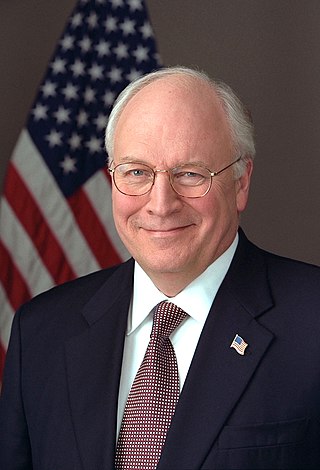
Electoral history of Dick Cheney, who served as the 46th vice president of the United States (2001–2009), 17th United States Secretary of Defense (1989–1993), United States representative from Wyoming, and White House Chief of Staff (1975–1977)

Electoral history of Ron Paul, Republican U.S. Representative from Texas, 1988 Libertarian Party Presidential nominee and candidate for the 2008 and 2012 Republican presidential nomination.
The 1884 Democratic National Convention was held July 8–11, 1884 and chose Governor Grover Cleveland of New York their presidential nominee with the former Governor Thomas A. Hendricks of Indiana as the vice presidential nominee.

The 1876 United States elections were held on November 7. In one of the most disputed presidential elections in American history, Republican Governor Rutherford B. Hayes of Ohio ended up winning despite Democratic Governor Samuel J. Tilden of New York earning a majority of the popular vote. The Republicans maintained their Senate majority and cut into the Democratic majority in the House.
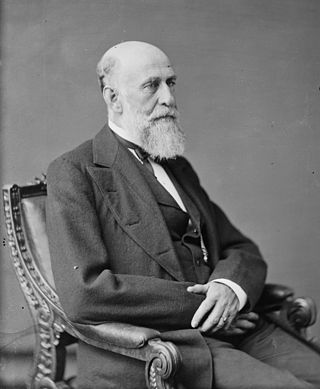
George Franklin Edmunds was an American attorney and Republican politician who represented the state of Vermont in the United States Senate from 1866 to 1891. He was a candidate for the Republican presidential nomination in 1880 and 1884 as a leading representative of New England and of the faction favoring civil service reform.

The 1992 United States presidential election in Maine took place on November 3, 1992, as part of the 1992 United States presidential election. Voters chose four representatives, or electors to the Electoral College, who voted for president and vice president.

The 1884 United States elections were held on November 4, electing the members of the 49th United States Congress. The election took place during the Third Party System. The Democratic Governor Grover Cleveland of New York defeated Republican Secretary of State James G. Blaine in the presidential election. In Congress, the Republicans retained control of the Senate while Democrats maintained control of the House of Representatives. This marks the last election in U.S. history in which the Democratic president came to office without unified control of Congress.

The 1980 United States presidential election in Maine took place on November 4, 1980. All fifty states and The District of Columbia were part of the 1980 United States presidential election. Voters chose four electors to the Electoral College, who voted for president and vice president. Maine was won by former California Governor Ronald Reagan (R) by a slim margin of 3%, carrying fourteen out of sixteen counties. In recent years, however, the state has grown much more liberal, and no Republican presidential nominee has carried it since 1988.

The 1884 United States presidential election in North Carolina took place on November 6, 1884, as part of the 1884 United States presidential election. North Carolina voters chose 11 representatives, or electors, to the Electoral College, who voted for president and vice president.
References
- ↑ "Our Campaigns - ME District 3 Race - Sep 08, 1862".
- ↑ "Our Campaigns - ME District 3 Race - Sep 11, 1864".
- ↑ "Our Campaigns - ME District 3 Race - Sep 10, 1866".
- ↑ "Our Campaigns - ME District 3 Race - Sep 14, 1868".
- ↑ "Our Campaigns - ME District 3 Race - Sep 12, 1870".
- ↑ "Our Campaigns - ME District 3 Race - Sep 09, 1872".
- ↑ "Our Campaigns - ME District 3 Race - Sep 14, 1874".
- ↑ "Our Campaigns - US House Speaker Race - Mar 04, 1869".
- ↑ "Our Campaigns - US House Speaker Race - Mar 04, 1871".
- ↑ "Our Campaigns - US House Speaker Race - Dec 01, 1873".
- ↑ "Our Campaigns - US House Speaker Race - Dec 06, 1875".
- ↑ "Our Campaigns - ME US Senate Race - Jan 16, 1877".
- ↑ "1884 Presidential General Election Results". uselectionatlas.org. Dave Leip's Atlas of U.S. Elections. Retrieved April 1, 2019.